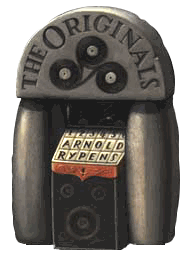FRANKIE AND ALBERT / FRANKIE AND JOHNNY
Created on 29/06/2005Latest update on 13/12/2023
Artist: Gene Green & Charlie Straight
Author: Bill Dooley?
Label: Pathé
Year: 1913
Oldest version (recorded on tour in London!) with a Frankie & Johnny referrence. Only two copies survived, one at the Library of Congress, one with collector Peter Muir (longlostblues.com). But the song existed for years, can be traced back to a distinctive case-story, even to one particular author. The facts: on October 16, 1899 the St. Louis Republic opens with the headline: Negro Shot By Woman. Somewhere in the 'sporting area' of town Frankie Baker shot her lover Allen or Albert Britt following a quarrel over another woman (Nellie Bly) who'm he just won a dance contest with in Stolle's Dance Halls. It took a mere 24 hours for a Bill Dooley to make up a song from these facts (Frankie Killed Allen), selling it for 10 cents a piece in downtown St. Louis while performing it on street corners. The longer the story was kept alive in newspaper columns (another two days and Al Britt died of his wounds), the more popular his song. No matter the banality, full ten years after the fact this ballad still circulated and not only in St. Louis, for in 1909 father John A. Lomax collected two distinct versions in Texas. The oldest known publication of the melody was in 1904 under title He Done Me Wrong (The Death Of Bill Bailey). Under title Frankie And Johnny the song was first published in 1912 (music and words by The Leighton Bros. & Ren Shields). Came 1927, more than 100 variations of this ballad circulated and that was even before the big recording break. In 1934, John A. & Alan Lomax counted some 300 published versions in their American Ballads And Folk Songs. Comment of the Lomaxes: "No one has ever publicly heard the same version twice, unless from two convict performers who shared the same cell for years." These 300 variations begged for a doctorate's degree paper, finally written by Bruce Buckley who makes a clear distinction between the Frankie & Albert's following the St. Louis facts and the more popular fantasy variation Frankie & Johnny, published in 1912 with music by the Leighton Brothers. Without giving any further information upon the identity of said Bill Dooley, The Rose And The Briar, a publication on American ballads edited by Sean Wilentz and Greil Marcus (Norton) suggest this same street singer might just as well be the author of that other American ballad warhorse Stagolee / Stagger Lee (see Stack O' Lee Blues), with also a St. Louis murder case where it all came from.
Covers:
- 1921:
Paul Biese Trio [with Frank Crumit for Columbia]
- 1921:
- 1923:
- 1924:
- 1926:
Charlie Poole & The North Carolina Ramblers [as Leavin' Home]
- 1927:
- 1927:
Frank Crumit [new recording for Victor]
- 1928:
Mississippi John Hurt [sounding like a 1910 recording]
- 1929:
- 1929:
- 1929:
- 1929:
- 1929:
Nick Nichols [divides the plot in two scenes: The Shooting Scene and The Courtroom Scene; he also incorporates elements of The Dying Cowboy and St. James Infirmary]
- 1930:
Tom Darley & Jimmie Tarlton [as Frankie Dean]
- 1932:
Mae West [in her Broadway play Diamond Lil, leading to film She Done Him Wrong (with Cary Grant)]
- 1935:
- 1942:
- 1942:
Guy Lombardo [with the famous opening line "Frankie and Johnny were sweethearts"]
- 1942:
- 1956:
- 1956:
- 1957:
- 1959:
Johnny Cash [as Frankie's Man Johnny]
- 1960:
Yoka Berretty [as De Ballade Van Frankie En Johnny]
- 1961:
- 1961:
- 1963:
Sam Cooke [one year before getting shot at by some Frankie himself]
- 1965:
Elvis Presley [in film Frankie And Johnny]
- 1969:
- 1973:
- 1977:
- 1983:
- 1983:
- 1984:
Divine Horsemen [as Frankie Silver]
- 1991:
James Intveld [in remake film Frankie And Johnny]
- 1992:
Michelle Shocked [theme in Hold Me Back, where there's no mentioning of murder ("Hold me back before I do what must be done...")]
- 1992:
Bob Dylan [follows Rory Block's Frankie And Albert version]
- 1992:
Terence Trent D'Arby [as "T.I.T.S."/"F & J"]
- 1993:
- 1998:
- 1999:
- 1999:
Snakefarm [with Anna Domino]
- 2001:
Chris Smither [on Mississippi John Hurt tribute Avalon Blues]
- 2003:
- 2006:
Beth Orton [as Frankie on The Harry Smith Project Revisited]
- 2006:
Lindsay Lohan [in Robert Altman film A Prairie Home Companion]
A far cry to 12-bar blues forms; therefore regarded as of European - more precisely of Scottish - descent (early 19th century). In 1930 future film director John Huston published a book Frankie & Johnny based upon his interviews with Frankie Baker's brother. Two years later he turned it into a play.


